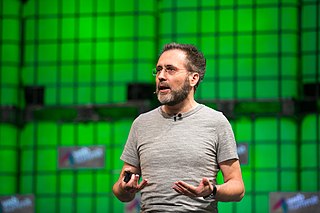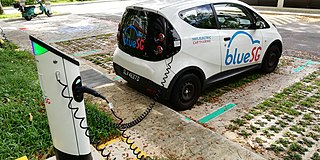
Infrastructure is the set of facilities and systems that serve a country, city, or other area, and encompasses the services and facilities necessary for its economy, households and firms to function. Infrastructure is composed of public and private physical structures such as roads, railways, bridges, tunnels, water supply, sewers, electrical grids, and telecommunications. In general, infrastructure has been defined as "the physical components of interrelated systems providing commodities and services essential to enable, sustain, or enhance societal living conditions" and maintain the surrounding environment.

The World Business Council for Sustainable Development (WBCSD) is a CEO-led organization of over 225 international companies. The council is also connected to 60 national and regional business councils and partner organizations.
A green economy is an economy that aims at reducing environmental risks and ecological scarcities, and that aims for sustainable development without degrading the environment. It is closely related with ecological economics, but has a more politically applied focus. The 2011 UNEP Green Economy Report argues "that to be green, an economy must not only be efficient, but also fair. Fairness implies recognizing global and country level equity dimensions, particularly in assuring a Just Transition to an economy that is low-carbon, resource efficient, and socially inclusive."

The Co-operative Group Limited, trading as Co-op and formerly known as the Co-operative Wholesale Society, is a British consumer co-operative with a group of retail businesses including grocery retail and wholesale, legal services, funerals and insurance retailing.
Green computing, green IT, or ICT sustainability, is the study and practice of environmentally sustainable computing or IT.
A sustainable business, or a green business, is an enterprise that has a minimal negative impact or potentially a positive effect on the global or local environment, community, society, or economy—a business that strives to meet the triple bottom line. They cluster under different groupings and the whole is sometimes referred to as "green capitalism." Often, sustainable businesses have progressive environmental and human rights policies. In general, a business is described as green if it matches the following four criteria:
- It incorporates principles of sustainability into each of its business decisions.
- It supplies environmentally friendly products or services that replace demand for nongreen products and/or services.
- It is greener than traditional competition.
- It has made an enduring commitment to environmental principles in its business operations.

Urs Hölzle is a Swiss software engineer and technology executive. As Google's eighth employee and its first VP of Engineering, he has shaped much of Google's development processes and infrastructure, as well as its engineering culture. His most notable contributions include leading the development of fundamental cloud infrastructure such as energy-efficient data centers, distributed compute and storage systems, and software-defined networking. Until July 2023, he was the Senior Vice President of Technical Infrastructure and Google Fellow at Google. In July 2023, he transitioned to being a Google Fellow only.

Clean technology, in short cleantech or climatetech, is any process, product, or service that reduces negative environmental impacts through significant energy efficiency improvements, the sustainable use of resources, or environmental protection activities. Clean technology includes a broad range of technology related to recycling, renewable energy, information technology, green transportation, electric motors, green chemistry, lighting, grey water, and more. Environmental finance is a method by which new clean technology projects can obtain financing through the generation of carbon credits. A project that is developed with concern for climate change mitigation is also known as a carbon project.

KiwiSaver is a New Zealand savings scheme which has been operating since 2 July 2007. Participants can normally access their KiwiSaver funds only after the age of 65, but can withdraw them earlier in certain limited circumstances, for example if undergoing significant financial hardship or to use a deposit for a first home.

Australian Ethical is an ethical investment management company, listed on the ASX, and based in Sydney, Australia

The Pembina Institute is a Canadian think tank and registered charity focused on energy. Founded in 1985, the institute has offices in Calgary, Edmonton, Toronto, Ottawa, and Vancouver. The institute's mission is to "advance a prosperous clean energy future for Canada through credible policy solutions that support communities, the economy and a safe climate."

Despite abundant natural resources and a relatively small population, New Zealand is a net importer of energy, in the form of petroleum products. The ratio of non-renewable and renewable energy sources was fairly consistent from 1975 to 2008, with about 70 per cent of primary energy supply coming from hydrocarbon fuels. This ratio decreased to about 60 per cent in 2018. The proportion of non-renewable energy varies annually, depending on water flows into hydro-electricity lakes and demand for energy. In 2018, approximately 60% of primary energy was from non-renewable hydrocarbon fuels and 40% was from renewable sources. In 2007 energy consumption per capita was 120 gigajoules. Per capita energy consumption had increased 8 per cent since 1998. New Zealand uses more energy per capita than 17 of 30 OECD countries. New Zealand is one of 13 OECD countries that does not operate nuclear power stations.
The Lemelson Foundation is an American 501(c)(3) private foundation. It was started in 1993 by Jerome H. Lemelson and his wife Dorothy. The foundation held total net assets of US$444,124,049 at the end of 2020 and US$484,432,021 at the end of 2021.
This page is an index of sustainability articles.

100Green, operating as Green Energy (UK) Ltd, is a British independent energy company based in Ware, Hertfordshire. It was established in 2001 by CEO Douglas Stewart. The company provides Ofgem-certified renewable electricity and green gas to a variety of customers, including homes, businesses, and organizations throughout England, Wales, and Scotland. It is currently the only energy supplier in the UK to offer 100% green gas.
Sustainability brands are brands that undertake sustainable practises in the workings of their business and champion them.
The Consumer Goods Forum (CGF) is a global, industry-led network that brings together over 400 member companies, including retailers, manufacturers, and other stakeholders from 70 countries in the consumer goods industry. It focuses on driving positive change and greater efficiency within the industry by addressing global challenges like sustainability, consumer health, and ethical supply chain practices. Among its significant initiatives is the Global Food Safety Initiative (GFSI), an industry-driven approach to food safety and quality.

Brianne West is a New Zealand environmentalist, entrepreneur and the founder of Ethique, the world's first zero-waste beauty brand. In 2016 she was named a "Global Thinker" by Foreign Policy magazine and in 2019 the EY Young Entrepreneur of the Year.
Neighbourly is a neighbourhood-based social networking website operating in New Zealand.
Ecotricity is New Zealand's carboNZero certified electricity provider.










